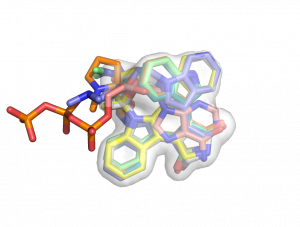Map set
The printable version is no longer supported and may have rendering errors. Please update your browser bookmarks and please use the default browser print function instead.
Map_set provides a number of common operations on and between maps. For example, with Map_set you can add two maps together or create a consensus map from a series of maps or even take a difference map.
Usage
map_set name, operator, operands, target_state, source_state
operator may be,
- average
- copy
- difference
- maximum
- minimum
- sum
- unique
Examples
# add 3 maps
map_set my_sum, sum, map1 map2 map3
# calculate the average map
map_set my_avg, average, map1 map2 map3
Detailed Example
This example shows you how to create a consensus map of the bound ligand in a conserved pocket.
# fetch some similar proteins from the PDB
fetch 1oky 1h1w 1okz 1uu3 1uu7 1uu8 1uu9 1uvr, async=0
# align them all to 1oky; their ligands
# should all now be aligned
alignto 1oky
# highlight the ligands
as sticks, org
# select one of the atoms in the organic small mol
sele /1uu3//A/LY4`1374/NAT
# select entire molecules very near the chosen atom
select bm. all within 1 of (sele)
# remove the proteins; just look at small molecules
remove not (sele)
# create maps for all the ligands
python
for x in cmd.get_names():
cmd.map_new( "map_" + x, "gaussian", 0.5, x)
python end
# calculate the average map
map_set avgMap, average, map*
# show as transparent surface
set transparency, 0.5
isosurface avgSurface, avgMap, 1.0
orient vis
Notes
source_state = 0 means all states
target_state = -1 means current state
This is an experimental function.
